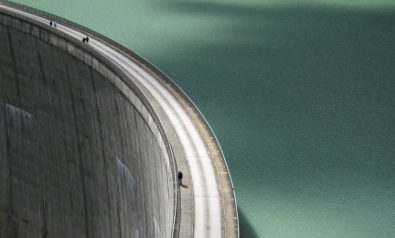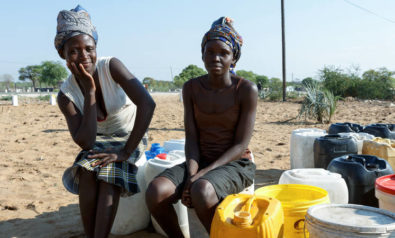The people of Zimbabwe are struggling with many problems, but the scale of the challenges they are facing in this drought is more than they can manage alone.
This year started with torrential rain: Bridges swept away in the north of England, my friend Colin’s studio in Yorkshire was under five feet of water and sludge. I thought about this on a long muddy walk on the Isle of Wight recently—the wettest January since records began over a hundred years ago.
Then, after the floods, I saw the disaster of drought in Zimbabwe—once the breadbasket of Africa exporting grain and food, now struggling to feed its people. In some of the areas such as Masvingo where CARE International is working, our local data indicate that 80% of crops are failing.
Disaster Unfolding
I was traveling the long miles from Harare with CARE Director Phil Christensen toward Masvingo—a province in Zimbabwe 300 kilometers from Harare, bordering South Africa and Mozambique. Though it is only 500 meters lower in altitude that Harare’s 1,500-meter elevation, the difference has a dramatic effect on the vegetation, even more so in a year affected by drought.
You could see the disaster unfolding, with shrunken maize that will never produce golden corn cobs, a vital staple food made into porridge or grilled as a roadside snack. Those feeble maize plants that will never develop will have a disastrous effect on local children, meaning less food in an area where rural children have their life chances, their physical and intellectual development damaged by malnutrition, a lack of calories and protein at key stages of their childhood development. Rural children in Zimbabwe have a high level of stunting caused by lack of food; food shortages caused by the drought also hit pregnant and breastfeeding women particularly hard.
I visited a school in Chivi, also in Masvingo province, where CARE International is working on an impressive program in partnership with World Vision and the United Kingdom’s Department of International Development, building the confidence and resilience of vulnerable girl children. You could see so clearly the impact of the daily struggle to get enough food. These poorer girls who were so thin, with the anxious expression that is so apparent in children who know that every aspect of life—food, water, security—cannot be taken for granted.
Challenging Solutions
Phil is an expert in agriculture and understands not only the problem, but also some of the most effective solutions. He also understands the impressive resilience and courage of the Zimbabwean people—a country with challenges but also real human assets. For a start, it has impressive levels of literacy of nearly 96%, but the economy is facing a difficult year with low growth of only 1.2% predicted and major problems caused by the drought.
The courageous and resilient people of Zimbabwe are struggling with so many problems, but the scale of the challenges they are facing in this drought is simply more than they can manage alone…
The solutions are complex and challenging, but the CARE team in Zimbabwe has real depth and national and local respect, working in the country since 1992. Phil himself has had two lengthy spells since 2000, a calm and thoughtful companion for our long hours on the dry and dusty roads, able to work the whole day in the burning sun without so much a cup of tea or a sip of water. I fear I am made of weaker stuff and had to fuel myself constantly from his water stocks and my snack pack.
Phil is worried about the impact of this drought and knows the carefully planned work they are doing must have more support to deliver what is so badly needed, particularly in the parched and dry lands of Masvingo site of the extraordinary Great Zimbabwe Ruins—a powerful expression of the ingenuity of the people of this beautiful country. These are the remains of an 11th to 15th-century city-state with impressive 10 meter-high, intricate dry stone built walls where the Zimbabwe birds—the national symbol of the country—were found.
I visited them over 20 years ago, and they are a reminder of a rich and complex history that existed before the invasion and colonization of this country by Cecil Rhodes in 1888, a colonial entrepreneur who, with his British South Africa Company, caused so much pain and loss for the people who lived there. What then became Rhodesia had endured so many years of ruthless occupation by those who plundered its riches.
Working Hard to Survive
The courageous and resilient people of Zimbabwe are struggling with so many problems, but the scale of the challenges they are facing in this drought is simply more than they can manage alone and they are badly in need of our support.
I met the people of a small village in Chivi who, working with CARE, have built a dam with their bare hands to feed the cattle and provide irrigation for a large field to grow vegetables for the community. Phil asked if we could see the field and our guide hesitated, seeing my gray hair—over rocks and hills, it was quite a walk in the hot sun.
When we arrived, we saw what they have achieved—the land bone dry, but cleared ready for irrigation, a well 50 feet down with only ladders made of sticks, dug by hand. There was no water yet, but they would continue determined until they hit the precious source.
But CARE’s strength is not only using tried and tested methods, building resilience and dams, but also using the new world of technology. Mobile phones have penetrated into even the most remote areas of Zimbabwe and have been priced to create a local market.
From seeing the impact of established irrigation technology to deal with the impact of drought, we traveled to Zaka to see new ways of helping those poor communities facing this crisis, unable to grow the food they need in this parched land.
CARE understands how important it is to protect local markets, it understands how important it is for women to be financially independent, and to ensure poor communities are fully involved and their voices heard.
The weather and its impacts are our global challenge. We must work together to build our common humanity.
In Zaka, I met the villagers who have worked with CARE on a new innovative program that gives control to women and their families, by paying small grants through the mobile phone system. These small grants can be used in the local shops to buy grain or whatever is most urgently needed in this crisis. It is impressive and ambitious but also sensitively delivered and designed.
CARE also ensures that this work is integrated with local government structures. The district administrator traveled with us to ensure we have a shared understanding of any issues or problems that might arise. The community is empowered to report problems, with the CARE team on hand to help with glitches and a special toll-free and confidential number to report difficulties is also available.
In Zimbabwe, this program is reaching more than 300,000 people, but so many more are in desperate need. It is working: As Beauty Pepukai, a local woman benefiting from this program, said at our meeting under the trees, “A hungry person is an angry person. This program has made us happy, we can buy maize and send our children to school.”
After the disaster in the north of England earlier this year, local Syrian refugees volunteered to help with the clean-up, building connections as well as restoring buildings.
We—who cannot understand what it is to struggle for every drop of water, to have to send our children to bed hungry or to see our crops wither in the fields—must remember the people of Zimbabwe, working so hard to survive. We must keep ourselves connected—from our wetland—to their difficult and dry land.
The weather and its impacts are our global challenge. We must work together to build our common humanity.
The views expressed in this article are the author’s own and do not necessarily reflect Fair Observer’s editorial policy.
Photo Credit: Oliver Reichenauer / Shutterstock.com
 We bring you perspectives from around the world. Help us to inform and educate. Your donation is tax-deductible. Join over 400 people to become a donor or you could choose to be a sponsor.
We bring you perspectives from around the world. Help us to inform and educate. Your donation is tax-deductible. Join over 400 people to become a donor or you could choose to be a sponsor.
Support Fair Observer
We rely on your support for our independence, diversity and quality.
For more than 10 years, Fair Observer has been free, fair and independent. No billionaire owns us, no advertisers control us. We are a reader-supported nonprofit. Unlike many other publications, we keep our content free for readers regardless of where they live or whether they can afford to pay. We have no paywalls and no ads.
In the post-truth era of fake news, echo chambers and filter bubbles, we publish a plurality of perspectives from around the world. Anyone can publish with us, but everyone goes through a rigorous editorial process. So, you get fact-checked, well-reasoned content instead of noise.
We publish 2,500+ voices from 90+ countries. We also conduct education and training programs
on subjects ranging from digital media and journalism to writing and critical thinking. This
doesn’t come cheap. Servers, editors, trainers and web developers cost
money.
Please consider supporting us on a regular basis as a recurring donor or a
sustaining member.
Will you support FO’s journalism?
We rely on your support for our independence, diversity and quality.


















